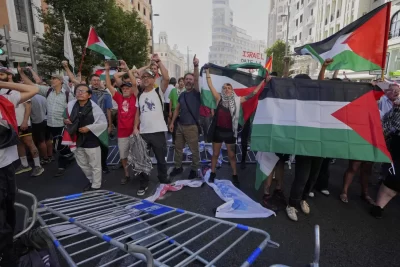
BANGKOK — Russia and Vietnam have developed a back-door method of concealing arms deal payments to avoid American and other Western sanctions, using the profits from joint oil and gas ventures to pay off defense contracts without any open transfers of cash through the global banking system, according to internal Vietnamese documents obtained by The Associated Press.
Under the system, Vietnam has purchased Russian military equipment including fighter jets, tanks and ships on credit from Moscow, then paid that credit back from its share of profits from a joint Vietnam-Russia oil company operating in Siberia. Such transactions are irregular in international financial markets and in this case are designed to keep cash quietly flowing even if sanctions aimed at ending Russia’s war on Ukraine are strengthened, the documents make clear.
The revelation comes at a precarious time when the U.S. is trying to strengthen ties with Vietnam as a bulwark against growing Chinese assertiveness in Southeast Asia, and has ongoing trade negotiations with Hanoi after the White House imposed 20% tariffs, while at the same time President Donald Trump is threatening even more stringent sanctions on Moscow.
The European Union has also added a raft of new sanctions to pressure Russian President Vladimir Putin to end the war, and Trump recently issued an executive order doubling tariffs on India to 50% to pressure New Delhi to stop buying Russian oil and military equipment, which he said was helping enable the war against Ukraine.
The Trump Organization, the president’s family business, also broke ground earlier this year on a $1.5 billion luxury golf complex outside the capital, Hanoi, after Vietnam fast-tracked approval. The president’s sons run the organization, but financial disclosures in June indicated that Trump himself benefits from many of its activities.
News that the unorthodox arrangement was in the works leaked in 2023. But rather than shutting it down, an internal document from last year reveals that Russia and Vietnam finalized and implemented it, while also making agreements to ensure it would produce sufficient funds for future military purchases.
The Vietnamese government document that was leaked in 2023 and the newer government document from last year were provided to The Associated Press by an official who said that he was part of a faction opposed to closer ties to Russia at the risk of jeopardizing the growing relationship with Washington. He provided the documents on condition of anonymity to protect himself from possible reprisals from Vietnam’s authoritarian government.
The U.S. State Department refused to comment specifically on the documents or the payment plan designed to skirt American sanctions, referring comments to the Vietnamese government. It reiterated broadly, however, that “our sanctions remain in place.”
“Those engaging in certain transactions or activities with sanctioned entities and individuals may expose themselves to sanctions risk or be subject to an enforcement action,” the State Department said in an email to the AP this week.
Vietnam’s Ministry of Industry, the Vietnam Oil and Gas Group, known as Petrovietnam or PVN, and the Foreign Ministry did not respond to multiple emails seeking comment on the payment scheme. Russia’s Finance Ministry, which conducted the negotiations for Moscow, also did not respond.
“It’s not your typical flexible financing. It’s not your typical offset or counter-trade provisions,” said Evan Laksmana, who leads the Southeast Asian Security and Defense research program for the International Institute for Strategic Studies think tank.
“It is,” Laksmana said, “next-level stuff.”
How the arrangement works
The mechanism involves using Vietnam’s profits from a joint Vietnam-Russia oil venture in Siberia, Rusvietpetro, to repay loans for military purchases while avoiding transactions through the global SWIFT network system, which powers most international financial transfers and is overseen by the United States and other Western nations. In effect, it’s a series of transactions that skip carefully laid global financial pathways, keeping transactions secret.
Final details of the agreement were laid out last summer in the 2024 memo obtained by the AP, from PVN to Vietnam’s Ministry of Industry and Trade ahead of a visit to Hanoi by Russian President Vladimir Putin.
The plan outlined involves:
—First, Vietnamese profits from the Rusvietpetro joint venture in Siberia are sent to Moscow to pay back credit extended for military purchases;
—then, Vietnam’s profits exceeding the loan repayments are transferred to Russian state-owned oil and gas company Zarubezhneft in Russia;
—finally, in Vietnam, Zarubezhneft uses its joint venture company there to transfer an equal amount of money to PVN, effectively avoiding any international financial transfers.
“In the context of the U.S. and Western countries imposing sanctions on Russia in general and removing Russia from SWIFT in particular, this payment method is considered relatively confidential and appropriate because money only circulates within the territory of Vietnam and Russia and Vietnam does not have to worry about the risks of being affected by the U.S. embargo,” PVN’s general director, Le Ngoc Son, writes in the June 11, 2024, document.
Laksmana said he did not have previous knowledge of the plan, but that it fit with Moscow’s approach toward arms deals in the region. In 2017, for example, Russia agreed to provide 11 Sukhoi Su-35 fighter jets to Indonesia in exchange for palm oil, coffee and other goods.
“Russia was for a long time in Southeast Asia considered to be among the most flexible in terms of its payment mechanisms,” he said.
Two Western diplomats posted to Hanoi said they had long suspected Vietnam and Russia had a backdoor agreement to pay for large military contracts, though the specifics of the agreement in the documents obtained by the AP were new to them. They both spoke on condition of anonymity due to the political sensitivities of the issue.
Why is the mechanism necessary?
Zarubezhneft does not currently face sanctions imposed following Russia’s attacks on Ukraine, though its CEO, Sergei Kudryashov, was named in a raft of sweeping sanctions on the Russian energy sector announced in January, ten days before Trump was inaugurated.
Zarubezhneft board chairman Evgeniy Murov, a former KGB officer, was also sanctioned by the U.S. in 2014 when he headed the Federal Protective Service, responsible for the safety of Russian President Vladimir Putin and other high-ranking officials.
As individuals on the Office of Foreign Assets Control’s SDN list, any assets they have in the U.S. would be blocked and Americans would be prohibited from having direct dealings with them.
The mechanism outlined in the documents obtained by the AP seems intended to avoid the possibility of future sanctions, and the threat of secondary sanctions that could be imposed on those who facilitate the activities of entities under primary sanctions.
“If you want to insulate yourself from any kind of risk, you then basically avoid cross-border transactions and create these kind of offsetting payment schemes,” said Ben Hilgenstock, a senior economist at the Kyiv School of Economics who is an expert on Russian sanctions and analyzed the Vietnamese documents for the AP.
Following a wave of fresh Russian attacks on Ukraine this month, Trump has said he is ready to move to a second phase of sanctions on Moscow or countries that buy its oil. Last week, EU and American officials met in Washington to discuss details. Last Friday, Britain announced a new set of sanctions targeting Russia’s oil revenues and military supplies, including banning 70 ships from a “shadow fleet” it said is being used to transport Russian oil to circumvent international sanctions.



